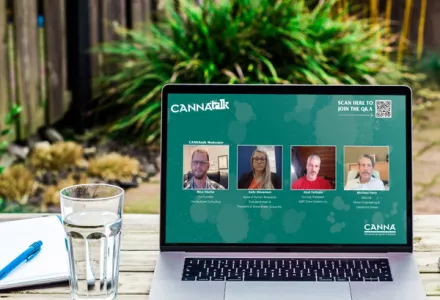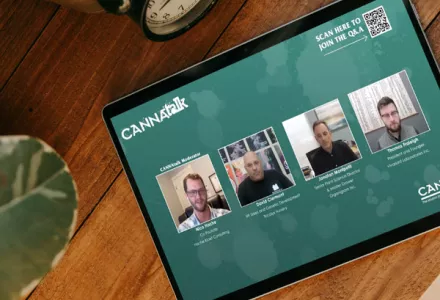Should Canadian producers put all their focus on the Canadian market or are there alternatives to be explored? With the current state of the Canadian market being inundated with product creating intense competition while also being taxed at an exorbitant rate, some producers are looking at other markets to off set the losses or small margins that are currently achievable. In this session we discussed the state of the Canadian industry and the potential for alternative international markets including lessons learned from those who have gone down that path.
On our panel we had:
- Deepak Anand, Head of Consulting at Gateway Proven Strategies Global, who brings a wealth of knowledge of international regulatory frameworks,
- Tanner Stewart, the CEO of Stewart Farms, a Canadian producer with Canadian GMP currently shipping product to Australia,
- Sean MacDougall, Head of Production and Procurement at EastCann, a Canadian processor, and
- Chad Esch, Master Grower of Safricanna, a South African producer with EU-GMP accreditation.
Watch the full length discussion
Why explore international markets? Well, 3 key factors come to mind:
- The global industry is predicted to be 73 billion dollars by 2027.
- The current cost per gram is much higher in international markets that can currently be achieved in Canada
- You don’t pay tax on products leaving the country. Read: NO CRA.
We discussed a few different approaches to accessing international markets. The most common seems to be getting EU-GMP certification. This certification opens up the ability to export cannabis products to most European countries where cannabis is legal. So why isn’t everyone doing it? It may not be quite as simple as it appears.
According to Deepak, there is no silver bullet regarding international certification where one size fits all for every market. Companies must do their own due diligence, understand what market segments they want to participate in, and in which country. They must also fully understand the importing countries’ regulations and/or certifications and ensure they are compliant.
In fact, Safricanna based in South Africa, recently received their EU-GMP certification. Chad Esch, Head of Production, gave us a summary of their experience in achieving this milestone and noted that it took almost 2 years of internal planning and implementation, along with the help of external consultants, to receive their accreditation.
While EU-GMP seems to be the most common path to being able to export cannabis to European countries, it isn’t the only option. One avenue that Stewart Farms decided to explore is a Canadian GMP certification. This certification enabled Tanner and team to export cannabis to Australia. Important to note is that Australia has recently (July 1) changed some of their regulations and the implications of that are not fully known at this time.
Sean explained that while they aren’t currently seeking EU-GMP certification, they have been able to tap into the international market by partnering with an EU-GMP facility enabling them to export product through that facility.
While it may seem a bit daunting to explore these new market opportunities (and certainly may not be for everyone) it does shed some light on a path to potential profitability during these uncertain times in Canada. Ensuring you perform due diligence, while leaning on those who have gone before you and those who have expertise in these areas will be key to taking advantage of new markets and being successful!





















